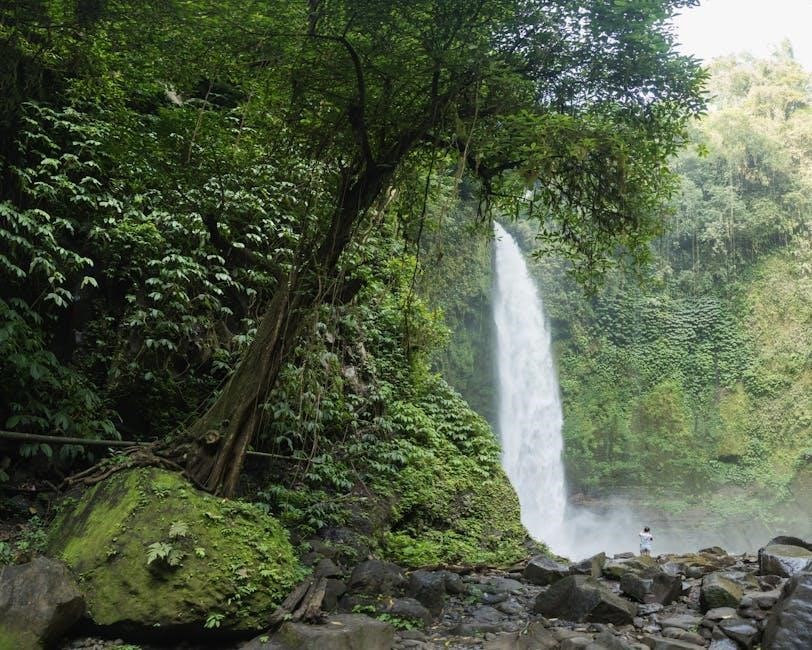Mihaly Csíkszentmihályi’s seminal work, Flow: The Psychology of Optimal Experience, explores the concept of being fully engaged in life. This book introduces the idea that true happiness arises when individuals experience flow, a state of complete absorption in an activity. By examining the psychology behind this optimal experience, Csíkszentmihályi provides insights into how people can cultivate fulfillment and meaning in their lives. The book has become a cornerstone in understanding human happiness and personal growth, offering practical wisdom for achieving a balanced and satisfying existence.
1.1. Overview of Mihaly Csíkszentmihályi’s Theory
Mihaly Csíkszentmihályi’s theory of flow posits that optimal experiences arise when individuals are fully engaged in activities that challenge their skills. He introduced the concept of the autotelic self, which seeks meaning and enjoyment in the present moment. Csíkszentmihályi’s work emphasizes the balance between challenges and skills, as well as the merging of action and awareness, as key elements of flow. His research spans decades, exploring how these experiences contribute to human happiness and personal growth, making his theory a foundational framework in modern psychology.
1.2. The Concept of Flow and Its Significance
Flow refers to a mental state of complete absorption and engagement in an activity, where one’s skills match the challenges at hand. This optimal experience is characterized by heightened focus, joy, and a sense of accomplishment. Csíkszentmihályi’s concept of flow highlights its significance in fostering happiness, creativity, and personal growth. By understanding and cultivating flow, individuals can transform mundane tasks into meaningful experiences, leading to a more fulfilling life. This concept has universal appeal, resonating across cultures and domains, making it a powerful framework for enhancing human well-being.
What is Flow?
Flow is a state of concentration and complete absorption in an activity, where cognitive, physiological, and affective aspects align, creating an optimal psychophysical state of engagement and fulfillment.
2.1. Definition and Core Characteristics
Flow, as defined by Mihaly Csíkszentmihályi, is a state of complete absorption and concentration in an activity, where individuals experience heightened focus and engagement. It combines cognitive, physiological, and affective aspects, creating an optimal psychophysical state. Key characteristics include clear goals, immediate feedback, and a balance between challenges and skills. During flow, self-consciousness fades, and action and awareness merge seamlessly. This state is inherently rewarding, enhancing creativity, productivity, and overall well-being, making it a cornerstone of optimal experience.
2.2. The Role of Flow in Human Happiness
Flow plays a central role in human happiness by enabling individuals to experience life at its fullest. According to Csíkszentmihályi, people are happiest when fully engaged in activities that challenge their skills, fostering a sense of fulfillment and satisfaction. This state enhances overall well-being and life satisfaction, as it allows individuals to feel more connected to their actions and goals. By cultivating flow, people can achieve a deeper sense of purpose and enjoyment, making it a vital component of a happy and meaningful life.

The Optimal Experience
The optimal experience refers to a state of complete engagement and fulfillment, where individuals feel fully alive and immersed in their activities. This concept, central to Csíkszentmihályi’s theory, describes a harmonious balance between skill and challenge, leading to heightened enjoyment and personal growth. It is through these experiences that people achieve their highest potential and derive lasting satisfaction from life.
3.1. Understanding the State of Optimal Experience
The state of optimal experience is characterized by heightened focus, enjoyment, and immersion in an activity. It occurs when challenges and skills are balanced, creating a sense of effortless engagement. This experience is often described as being “in the zone,” where time seems to stand still. The autotelic self emerges, transforming life’s challenges into opportunities for growth. By understanding this state, individuals can better cultivate moments of flow, leading to greater fulfillment and psychological well-being in their daily lives.
3.2. How Flow Contributes to Personal Growth
Flow is a powerful catalyst for personal growth, fostering skill development and self-awareness. Engaging in flow activities enhances one’s abilities, builds confidence, and encourages a sense of purpose. The autotelic self emerges, transforming challenges into meaningful experiences. Over time, flow experiences cultivate resilience, creativity, and a deeper understanding of oneself. This psychological growth enables individuals to pursue more complex challenges, leading to continuous development and a fulfilling life. Flow, therefore, is not just a momentary state but a pathway to lasting personal evolution and self-actualization.
Key Elements of an Optimal Experience
The optimal experience, or flow, is characterized by clear goals, immediate feedback, and a balance between challenges and skills. It involves heightened focus, merging action and awareness, creating a sense of timelessness and deep enjoyment. This state is intrinsically rewarding, fostering personal growth and fulfillment. The autotelic self thrives in such experiences, turning life’s challenges into opportunities for meaningful engagement and psychological flourishing.
4.1. The Autotelic Self and Its Role in Flow
The autotelic self is a concept central to flow, describing individuals who find purpose and meaning within activities themselves. These people are intrinsically motivated, seeking challenges that align with their skills. The autotelic self is crucial for entering flow, as it focuses on the inherent rewards of the task, rather than external pressures. This mindset allows individuals to fully immerse themselves in experiences, transforming challenges into enjoyable and growth-promoting opportunities. The autotelic self, therefore, is key to achieving the optimal psychological state of flow and fostering long-term fulfillment.
4.2. The Balance Between Challenge and Skill
Achieving flow requires a delicate balance between the challenge of an activity and the individual’s skill level. When challenges surpass skills, anxiety emerges, while skill levels exceeding challenges lead to boredom. The optimal state occurs when both challenge and skill are evenly matched, fostering full engagement and enjoyment. This balance is essential for entering the flow state, where personal growth and satisfaction are maximized. It is through this equilibrium that individuals experience the most fulfilling and immersive experiences.
4.3. The Merging of Action and Awareness
During a flow state, individuals experience a seamless integration of action and awareness, where their focus becomes entirely absorbed in the present moment. This merging eliminates self-consciousness, allowing actions to flow effortlessly without deliberate thought. The heightened concentration and alignment between intention and execution create a sense of automaticity, where the activity feels natural and intuitive. This phenomenon is central to the optimal experience, as it fosters a deeper connection to the task at hand, enhancing both enjoyment and performance.

Applications of Flow in Various Domains
Flow enhances productivity, creativity, and learning across education, workplace, and personal growth, offering a powerful tool for achieving optimal experiences and fostering meaningful engagement in diverse fields.
5.1. Flow in Education and Learning
Flow in education enhances learning by fostering engagement and intrinsic motivation. When students experience flow, they are fully absorbed in academic tasks, leading to deeper understanding and creativity. Teachers can create flow-friendly environments by aligning challenges with students’ skills, providing clear goals, and offering immediate feedback. This optimal experience not only improves academic performance but also nurtures a lifelong love for learning, making education more enjoyable and effective for students of all ages and skill levels.
5.2. Flow in the Workplace and Productivity
Flow significantly enhances workplace productivity by fostering focus and engagement among employees. When individuals are in a state of flow, they experience heightened concentration and creativity, leading to higher quality work. Organizations can promote flow by matching tasks to employees’ skill levels, providing clear goals, and minimizing distractions. This optimal experience not only boosts productivity but also increases job satisfaction and overall well-being, creating a more motivated and efficient workforce.
5.3. Flow in Personal Growth and Creativity
Flow plays a pivotal role in personal growth and creativity, as it allows individuals to push their limits while enjoying the process. Engaging in activities that induce flow fosters creativity, as the mind operates at its peak, generating innovative ideas. This optimal state enhances problem-solving skills and encourages exploration of new possibilities. By nurturing creativity and promoting self-improvement, flow contributes to a fulfilling and purposeful life, enabling individuals to explore their potential and achieve continuous personal development through immersive and meaningful experiences.
Mihaly Csíkszentmihályi’s Contributions
Mihaly Csíkszentmihályi’s groundbreaking theory of flow revolutionized psychology, offering insights into human happiness and optimal experiences. His work has profoundly influenced fields like education, workplace productivity, and personal development.
6.1. The Development of Flow Theory
Mihaly Csíkszentmihályi’s development of flow theory emerged from his curiosity about what makes people happy and fulfilled. Through extensive research, including interviews with artists, athletes, and professionals, he identified common patterns in their most rewarding experiences. He observed that people often described being fully engaged, losing track of time, and feeling a sense of effortless concentration. These observations led to the formulation of the flow concept, which he refined over decades, creating a framework to understand and achieve optimal experiences.
6.2. The Impact of His Work on Modern Psychology
Mihaly Csíkszentmihályi’s work has profoundly influenced modern psychology, particularly in the field of positive psychology. His concept of flow has become a foundational theory for understanding optimal experiences and human well-being. It has inspired research in motivation, creativity, and personal growth, reshaping how psychologists view happiness and fulfillment. The theory’s applications in education, workplace productivity, and mental health highlight its enduring relevance, making Csíkszentmihályi a pivotal figure in contemporary psychological thought.

The Cultural Context of Flow
Csíkszentmihályi’s theory of flow is universally relevant but shaped by cultural practices and values. While the experience of flow is consistent across cultures, its expression varies, reflecting diverse traditions and belief systems.
7.1. Universal Aspects of Optimal Experience
The universal aspects of optimal experience, as described in Csíkszentmihályi’s Flow: The Psychology of Optimal Experience, transcend cultural boundaries. The core components of flow—clear goals, immediate feedback, and a balance between challenge and skill—are consistent across diverse populations. People from different cultures report similar feelings of heightened focus and enjoyment when in a flow state. This universality underscores the idea that the pursuit of optimal experiences is a fundamental human endeavor, reflecting our shared psychological needs and desires for engagement and fulfillment.
7.2; Cultural Variations in Flow Experiences
Cultural variations in flow experiences highlight how different societies interpret and engage in optimal experiences. While the core components of flow remain consistent, their expression varies across cultures. In individualistic societies, flow often arises from personal achievements, while in collectivist cultures, it may stem from group harmony or community contributions. For instance, meditation in Eastern cultures and sports in Western societies both induce flow. These variations reflect how societal values shape the activities and contexts that foster optimal experiences, as explored in Csíkszentmihályi’s work and its digital availability.

The Digital Availability of “Flow: The Psychology of Optimal Experience”
The book is widely available in digital formats, including PDF and EPUB, making it accessible to readers worldwide. Its digital version, such as the Flow optimal experience PDF, ensures easy access to Csíkszentmihályi’s groundbreaking insights.
With identifiers like ark:/13960/t2z44j49p, the digital edition remains relevant in the modern era, offering timeless wisdom on happiness and fulfillment through optimal experiences.
8.1. The PDF Version and Its Accessibility
The PDF version of Flow: The Psychology of Optimal Experience is widely available online, offering readers easy access to Csíkszentmihályi’s groundbreaking theory. Platforms like PDFDrive provide downloadable versions, ensuring the book’s ideas reach a global audience. The digital format allows for seamless reading across devices, from smartphones to desktops, making it convenient for modern readers. Additionally, the PDF version is often archived with identifiers such as ark:/13960/t2z44j49p, ensuring its availability for future reference. This accessibility underscores the book’s enduring relevance in the digital age.
8.2. The Relevance of the Book in the Digital Age
Flow: The Psychology of Optimal Experience remains highly relevant in the digital age, offering timeless insights into human happiness and fulfillment. Despite the rise of technology, Csíkszentmihályi’s principles of engagement and balance resonate strongly with modern audiences seeking meaning in a fast-paced world. The book’s exploration of happiness and personal growth aligns with contemporary concerns about mental well-being and productivity. Its universal themes ensure its continued influence, making it a vital resource for understanding how to thrive in today’s society.
Flow: The Psychology of Optimal Experience by Mihaly Csíkszentmihályi remains a landmark book, offering transformative insights into happiness and engagement. Its relevance endures, inspiring future research and applications.
9.1. The Lasting Legacy of Csíkszentmihályi’s Work
Mihaly Csíkszentmihályi’s groundbreaking research on flow has left an indelible mark on psychology. His concept of optimal experience revolutionized understanding of happiness and engagement. The idea that true fulfillment comes from challenging yet skill-balanced activities has inspired diverse fields, from education to workplace productivity. Csíkszentmihályi’s work continues to influence modern psychology, emphasizing the importance of subjective experiences in achieving a meaningful life. His legacy endures as a foundational framework for personal growth and well-being in an ever-changing world.
9.2. The Future of Flow Research and Applications
Future research on flow will likely explore its applications in emerging technologies and diverse cultural contexts. The digital availability of Flow: The Psychology of Optimal Experience as a PDF ensures its principles reach a broader audience. Advances in AI and wearable tech could help monitor and induce flow states, enhancing productivity and well-being. Additionally, cross-cultural studies may uncover new insights into universal aspects of optimal experience, further enriching Csíkszentmihályi’s theory and its practical applications in education, workplace, and personal growth.
